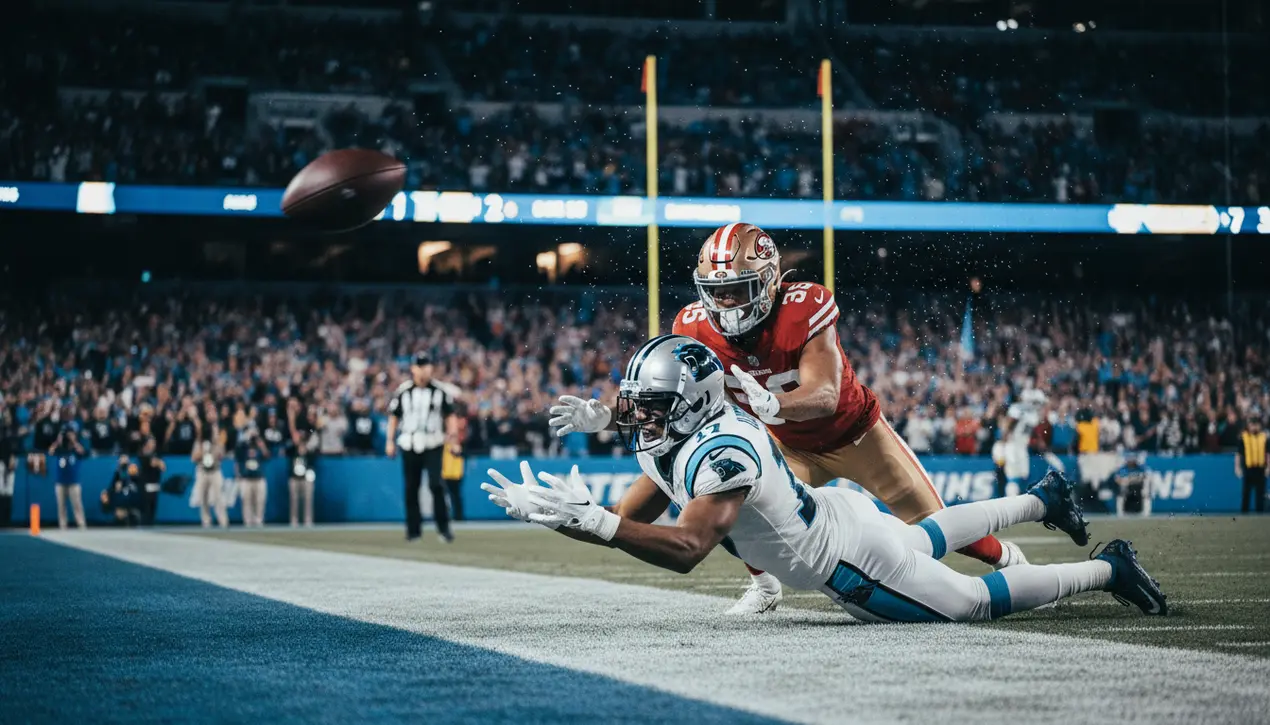
SportfootballInjuries and Suspensions
After foul on one-point try, Panthers missed opportunity for favorable field position
JA
Jack Turner
5 hours ago7 min read3 comments
The Carolina Panthers' 17-10 loss to the San Francisco 49ers last night will be dissected for many reasons, but one critical decision following a third-quarter touchdown reveals a fascinating blind spot in how teams are adapting—or failing to adapt—to the NFL's new kickoff rules. After quarterback Bryce Young connected with receiver Tetairoa McMillan on a spectacular 29-yard touchdown pass, cutting the deficit to 17-9, the Panthers faced the conventional analytics-driven choice: attempt a two-point conversion.Succeed, and you're down six; fail, and it's still a one-score game at 17-10. Carolina initially played it safe, kicking the extra point to make it 17-10, but the game's dynamics shifted when the 49ers were flagged for unnecessary roughness for hitting the snapper.This penalty presented Carolina with a golden, and largely overlooked, strategic fork in the road. They could either accept the penalty and move the two-point attempt from the two-yard line to the one, or they could decline it and enforce the penalty on the ensuing kickoff, moving their kickoff spot from the 35-yard line to the 50.In a knee-jerk reaction that betrayed a lack of deeper strategic foresight, the Panthers immediately opted for the two-point attempt from the one. The play call itself was baffling; they ran a congested end-zone pass that took zero advantage of the shortened field.Snapping from the one instead of the two actually condensed the offensive formation, making the defense's job easier, and the play failed miserably. What makes this decision so perplexing is what they sacrificed.The new kickoff formation, designed to increase returns and reduce high-speed collisions, has a subtle loophole that smart teams should be exploiting. By kicking off from the 50, a team can intentionally kick the ball out of bounds.According to the rulebook, if a kickoff goes out of bounds between the goal line and the 25-yard line, the receiving team is awarded the ball at the 25. A standard touchback in the new formation places the ball at the 20, so this maneuver would have pinned the 49ers at their own 25, a net gain of five yards of field position and a significant psychological blow.Imagine the scenario: instead of a failed two-point attempt, the Panthers could have kept the point, making it a one-possession game at 17-10, and then forced Brock Purdy and the 49ers' offense to start a drive at their own 25, knowing full well that one mistake—a fumble, an interception, a three-and-out—could hand Carolina the ball back with excellent field position and all the momentum. This is not mere Monday morning quarterbacking; this is a fundamental misreading of the risk-reward calculus in the modern NFL.The Panthers' coaching staff, like many around the league, seems to be operating with an outdated playbook when it comes to in-game management under the new special teams rules. The broadcast booth didn't even mention this alternative, which speaks to how nascent this strategic layer is.Historically, coaches have been notoriously slow to adapt to rule changes; it took years for the league to fully embrace the value of going for it on fourth down, a concept that analytics has long supported. We are witnessing a similar evolution with kickoff strategy.This was a missed opportunity not just for the Panthers, but for the entire league to see a savvy, forward-thinking decision in action. The consequence for Carolina was tangible: they lost a chance to seize control of the game's field position battle and ultimately lost the contest.For the other 31 teams, it should serve as a wake-up call. In a league where margins of victory are razor-thin, mastering these nuanced rule interactions is what separates playoff contenders from also-rans.The Panthers had a chance to be pioneers and instead chose a conventional, failed path. One can only hope the next team facing this decision will have done its homework.
#NFL
#Carolina Panthers
#San Francisco 49ers
#kickoff rules
#strategy analysis
#penalty decision
#featured
Stay Informed. Act Smarter.
Get weekly highlights, major headlines, and expert insights — then put your knowledge to work in our live prediction markets.
Related News
Comments
Loading comments...
© 2025 Outpoll Service LTD. All rights reserved.